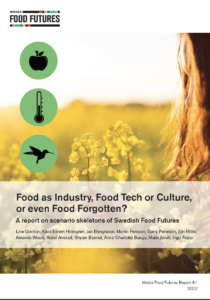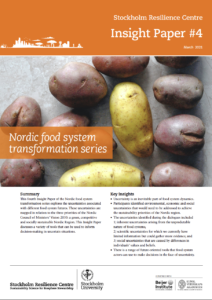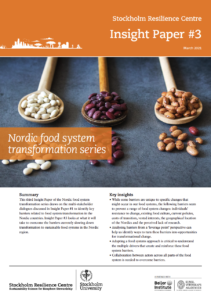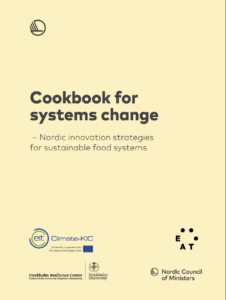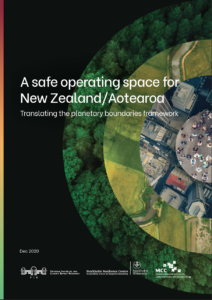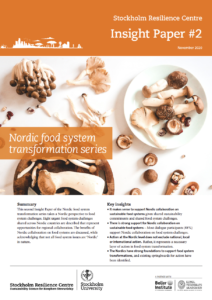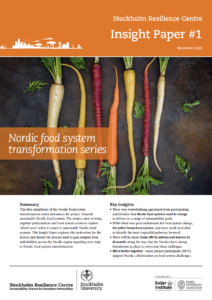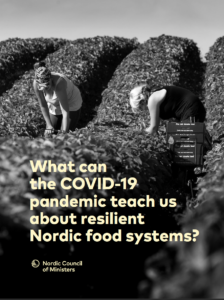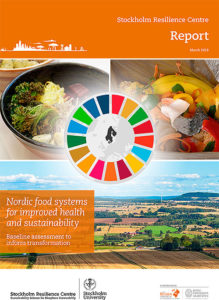As a researcher focused on communicating science to societal actors, I have produced and co-authored both peer-reviewed research published in academic journals, as well as a range of open-access reports and briefs written for a range of food system actors.
Reports and Briefs
Food as Industry, Food Tech or Culture, or Even Food Forgotten?
September 2022
What will Swedish food systems look like in 2045? This report explores four different scenarios for the future of Swedish food in terms of what will be produced and how that production might be impacted by a changing climate, technological advancements and other unpredictable shocks. It explores what we might eat, and the outcomes of valuing our food to a greater or lesser extent. Importantly, the report explores how climate, biodiversity and nutrition might be affected by the pathway we choose to take.
This report is part of the Mistra Food Futures, a programme led by the Swedish University of Agricultural Sciences in collaboration with the Stockholm Resilience Centre at Stockholm University and the Research Institute of Sweden. The research consortium works with over a dozen food system actors to enable transformation to sustainable Swedish food systems.
Insight paper #4 of the Nordic food system transformation series: Food system transformation in the face of uncertainty
March 2021
When thinking about food system transformation, the only certainty is...uncertainty. This insight paper explores the environmental, economic and social uncertainties associated with various future food systems in the Nordics. A range of future-oriented tools are presented that can be used by actors to make decisions in the face of uncertainties.
This report was an output from the project Towards sustainable Nordic food systems, funded by the Nordic Council of Ministers and the Marianne and Marcus Wallenberg Foundation. The project brought 115 food system stakeholders together in full-day dialogues to explore 'what's next' when it comes to sustainable Nordic food systems.
Insight paper #3 of the Nordic food system transformation series: Barriers to food system transformation in the Nordics
March 2021
This insight paper draws on multi-stakeholder dialogues to explore what it will take to overcome the barriers slowing the transformation to sustainable food systems in the Nordic region. Using the leverage point framework, these barriers are turned into opportunities for change. The insight paper highlights that there is no simple way to activate each leverage point, but adopting a food-systems approach and collaboration among actors will be critical.
This report was an output from the project Towards sustainable Nordic food systems, funded by the Nordic Council of Ministers and the Marianne and Marcus Wallenberg Foundation. The project brought 115 food system stakeholders together in full-day dialogues to explore 'what's next' when it comes to sustainable Nordic food systems.
Innovation for sustainable food systems: a Nordic cookbook of strategies
December 2020
We must work with strategic innovation of food systems to solve the grand challenges facing humanity. This cookbook for systems change focuses on the role that public sector innovation can play in food transformations. The mission approach, advocated by Mariana Mazzucato, is one approach to put innovation at the heart of transformation. We adopt the mission approach to the Nordic food system context, providing templates for developing interventions, guides for how to get started and examples of cross-cutting projects.
The cookbook was a collaboration between the Nordic Council of Ministers, the Stockholm Resilience Centre, and Afton Halloran, sustainable food system consultant. The work was funded by EIT Climate-KIC.
A safe operating space for New Zealand/Aotearoa: Translating the planetary boundaries framework
December 2020
The nine planetary boundaries define the environmental limits within which societies can survive and thrive. In this report, the planetary boundaries are translated to the New Zealand context. The national pressure on five planetary boundaries was assessed from both a production and consumption perspective. New Zealand’s food production and consumption was assessed as a case study to illustrate the necessary domestic transition towards sustainability.
This report was commissioned by the New Zealand Ministry for the Environment as part of their work towards long-term environmental stewardship. It was produced by the Potsdam Institute for Climate Impact Research, the Stockholm Resilience Centre and the Mercator Research Institute on Global Commons and Climate Change.
Insight paper #2 of the Nordic food system transformation series: Eight opportunities for Nordic collaboration on food system challenges
November 2020
The Nordic region has strong foundations to support food system transformation - but where to start? This insight paper describes eight entry points for Nordic collaboration on sustainable food systems. For each entry point, existing Nordic intitiatives are identified that can be used as springboards of action.
This report was an output from the project Towards sustainable Nordic food systems, funded by the Nordic Council of Ministers and the Marianne and Marcus Wallenberg Foundation. The project brought 115 food system stakeholders together in full-day dialogues to explore 'what's next' when it comes to sustainable Nordic food systems.
Insight paper #1 of the Nordic food system transformation series: Towards sustainable Nordic food systems – project overview
November 2020
This first installment of the Nordic food system transformation series introduces the project Towards sustainable Nordic food systems. The project aims to bring together policymakers and food system actors to explore 'what’s next’ when it comes to sustainable Nordic food systems. This Insight Paper explores the motivation for the project and details the process used to gain insights from stakeholders across the Nordic region regarding next steps in Nordic food system transformation.
What can the COVID-19 pandemic teach us about resilient Nordic food systems?
July 2020
The Covid-19 pandemic laid bare the vulnerabilities in our global food systems. This think piece explored the vulnerabilities in Nordic food systems that were exposed in the early phase of the pandemic. The piece also highlights the importance of building the resilience of our food systems. The seven resilience principles are used to illustrate approaches that could prepare our food systems to cope and adapt in the face of future shocks.
This think piece was commissioned by the Nordic Council of Ministers and written by Afton Halloran, food systems consultant, and researchers at the Stockholm Resilience Centre.
Nordic food systems for improved health and sustainability: baseline assessment to inform transformation.
April 2019
The Nordic countries have pioneered several sustainable food system innovations, such as the incorporation of environmental sustainability into dietary guidelines and strict animal welfare regulations. However, the Nordics are falling short on several dietary, health and environmental goals. In this report, we conduct a baseline assessment of current Nordic food consumption, production and waste. We then translate global food system targets to the Nordic context and assess the gap between current and desired food systems. The report uses the leverage point approach to propose actions to close this gap, and identifies potential barriers to sustainable transformation.
The Stockholm Resilience Centre at Stockholm University was commissioned by Livsmedelsverket (the Swedish National Food Agency) to undertake an initial analysis of what food systems transformations might look like, based on the findings from the EAT-Lancet Commission Report on Healthy Diets from Sustainable Food Systems.
Peer-reviewed journal articles
Wood A, Moberg E, Curi-Quinto K, Van Rysselberge P, Röös E. From “good for people” to “good for people and planet”– Placing health and environment on equal footing when developing food-based dietary guidelines. Food Policy. 2023; 117: 102444.
Wood A, Queiroz C, Deutsch L, González-Mon B, Jonell M, Pereira L, Sinare H, Svedin U, Wassénius E. Reframing the local-global food systems debate using a resilience lens. Nature Food. 2023; 4: 22-29.
Basnet S, Wood A, Röös E, Jansson T, Fetzer I, Gordon, LJ. Organic agriculture in a low-emission world: exploring combined measures to deliver sustainable food systems in Sweden. Sustainability Science. 2023; 18: 501-519.
Röös E, Wood A, Säll S, Hatab AA, Ahlgren S, Hallström E, Tidåker P, Hansson H. Diagnostic, regenerative or fossil-free-exploring stakeholder perceptions of Swedish food system sustainability. Ecological Economics. 2023; 203:107623
Bunge AC, Wood A, Halloran A, Gordon L. A systematic scoping review of the sustainability of vertical farming, plant-based alternatives, food delivery services and blockchain in food systems. Nature Food. 2022; 3: 933-941.
Hebinck A, Selomane O, Veen E, De Vrieze A, Hasnain S, Sellberg M, Sovová L, Thompson K, Vervoort J, Wood A. Exploring the transformative potential of urban food. npj Urban Sustain. 2021; 1(1): 1-9.
Moberg E, Karlsson Potter H, Wood A, Hansson P, Röös E. Benchmarking the Swedish diet relative to global and national environmental targets – identification of indicator limitations and data gaps. Sustainability. 2020; 12(4): 1407.
Willett W, Rockström J, Loken B, Springmann M, Lang T, Vermeulen S, Garnett T, Tilman D, Wood A, et al. Our Food in the Anthropocene: The EAT-Lancet Commission on Healthy Diets from Sustainable Food Systems. Lancet. 2019; 393(10170): 447-492.
Wood A, Tenbensel T. A Comparative Analysis of Drivers of Collaborative Governance in Front-of-Pack Food Labelling Policy Processes. J Comp Policy Anal. 2017; 20(4): 404-419.
Jones A, Magnusson R, Swinburn B, Webster J, Wood A, Sacks G, Neal B. Designing a Healthy Food Partnership: lessons from the Australian Food and Health Dialogue. BMC Public Health. 2016; 16:651.
Swinburn B, Wood A. Progress on obesity prevention over 20 years in Australia and New Zealand. Obes Rev. 2013; 14 (Suppl. 2): 60-8.
Wood A, Tenbensel T, Utter J. The divergence of country of origin labelling regulations between Australia and New Zealand. Food Policy. 2013; 43: 132-141.
Rayner M, Wood A, Lawrence M, Ni Mhurchu C, Albert J, Barquera S, Friel S, Hawkes C, Kelly B, Kumanyika S, L'Abbé M, Lee A, Lobstein T, Ma J, Macmullan J, Mohan S, Monteiro C, Neal B, Sacks G, Sanders D, Snowdon W, Swinburn B, Vandevijvere S, Walker C, INFORMAS. Monitoring the health-related labeling of foods and non-alcoholic beverages in retail settings. Obes Rev. 2013; 14 (S:1):70-81.
Wood A, Utter J, Robinson E, Ameratunga S, Fleming T, Denny S. Body weight satisfaction among New Zealand adolescents: findings from a national survey. Int J Adolesc Med Health. 2012; 24(2): 161-7.
